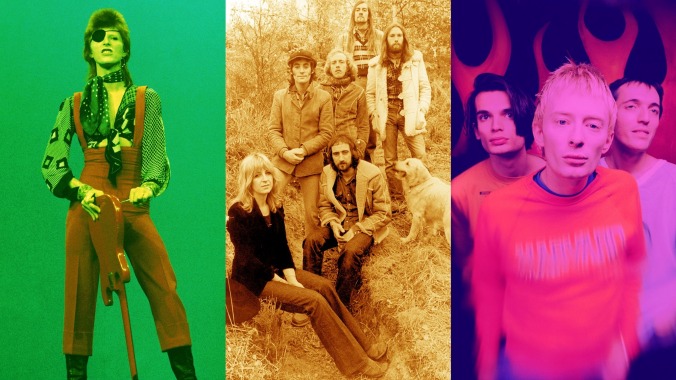Late to the party: What pop culture did you come around to long after everyone else?


This week’s question arose from an A.V. Club staff discussion:
What pop culture did you only come around to long after every other fan had already jumped on the bandwagon?
Josh Modell
I think I missed out on a few great things in the ’90s because I foolishly thought I was too cool for them, Radiohead perhaps being the prime example. It’s easy to forget that the band came out of the gate looking and sounding like a one-hit wonder, not like a group that would (theoretically, anyway) have such a massive impact on music. So I remember thinking “Creep” was okay but overplayed, and the rest of Pablo Honey fairly ordinary. (I still hold that opinion.) But I largely ignored The Bends when it came out, which, as it turns out, was a pretty dumb thing to do. And I remember hearing OK Computer for the first time, shortly before it came out, and getting hit by that same lightning bolt as everyone else. So now I take this very controversial opinion and deliver it to you: Radiohead is actually a very good band.
Caitlin PenzeyMoog
“Late to the party” describes my relationship with music in general. I absorb new music at a rate slower than a snail’s pace, so whatever I’m listening to was popular at best three years ago. My sister used to give me albums (back in college when we still had physical CDs), and she knew I’d like, say, Vampire Weekend. She was totally right; it just took a few years for me to get around to listening to it. More recently, I’ve gotten into Fleetwood Mac. By “recently” I mean within the past year, when I added Rumours to my rotation of the Hamilton soundtrack, Sufjan Stevens’ Carrie & Lowell, and my standby playlists of Bruce Springsteen and ambient nature recordings. When I take in a new album, I typically listen to that album, and only that album, on repeat for days or weeks. So it’s been a good time with Rumours. Maybe I’ll listen to Tusk next year.
William Hughes
I’ve never really clicked with Capcom’s Resident Evil series of survival horror games, and so I felt maybe a little too comfortable dismissing the crazed reactions that greeted the series’ legendary action reinvention, Resident Evil 4. (To my slight credit, I tried it once shortly after its release, got chopped in half with a chainsaw about five minutes in, and promptly put it away.) And so it is with a certain sheepishness that I admit that I finally bit the bullet late in 2016 and tossed myself wholeheartedly into the game’s PC port. And guess what? Resident Evil 4 is exactly as good as people had been screaming at me about for an entire damn decade. It’s not just an increasingly crazy action movie deviation from the series’ usual horror plots, but the blueprint for so many games I’ve loved that had copied it over the years. And yet, despite serving as the template for a billion third-person action games, RE4’s deeper charms are all its own: the brilliant rising tension of the cabin shoot-out, the way it makes escort missions exciting challenges instead of inescapable headaches, and even that opening sequence that put a whirring blade through my torso so many years ago. Dear friends who told me to play Resident Evil 4: You were right, I was wrong, and stupid. I’m glad we could get that on the record.
Kyle Ryan
I had multiple opportunities to see Elliott Smith before his death in 2003. Some of my friends were huge fans and talked about him often, but all of it was lost on me. I don’t know what music of his I’d heard, but it apparently didn’t take, and I didn’t dig any deeper. Then one of those friends sent me an MP3 of “The Biggest Lie” while I was in the throes of a soul-crushing breakup, and it hit me like the train Smith’s waiting for in the song. I quickly fell into listening to his self-titled album obsessively while diving into the other stuff I hadn’t heard. Sadly, it was too late in one regard: Smith played Chicago only one time after I joined the party, when I was out of town. (But all the parentheticals on this set list make me feel a little better about missing it.)
Sam Barsanti
As someone who works from home and spends most of the day alone, I’m always on the lookout for new podcasts. That being said, I spent years feeling ill-equipped to get on board with Comedy Bang! Bang!, despite the fact that so many people liked it. From the outside, it seemed like the Game Of Thrones of podcasts, something with hundreds of hours of history that I’d need to learn in order to understand why they say “nose” instead of “two” or whatever. When the TV show came out, I figured it would be a perfect introduction to the podcast’s world, but I still didn’t really “get it.” Finally, around 2014—after the show had been on for a few seasons and the podcast had long since become the preeminent hip comedy destination—I decided to jump into the deep end and check out the most recent best-of episodes. Then, long after everyone had already decided that CBB is great, I came to an exciting conclusion: CBB… is great.
Gwen Ihnat
Seeing as they’re my favorite band of all time, I can’t believe how late I came to this party, but I flaked on the whole first wave of The Replacements. I saw their Minnesota brethren Soul Asylum every single time they came to my college town of Champaign, Illinois, but somehow missed their legendary drunken brawl bashes. It wasn’t until 1987’s Pleased To Meet Me, album number five, that I finally tuned in, so my first Replacements show (and the last until 2013’s Riot Fest) was at the relatively fancy Aragon Ballroom, with no fights or drunken onstage antics that I can recall. I made up for lost time in short order, playing Let It Be and Tim on an almost continuous loop for a few years, but what I wouldn’t have given to be at one of those famed, abbreviated ’Mats bash shows.
Sean O’Neal
It took me far longer than I care to confess to get into David Bowie—an artist who’s meant so much to me for so long, yet whom I largely felt ambivalent, even somewhat dismissive toward until my junior year of high school, for crying out loud. If I can offer up any sort of defense, it’s that I came of age in the ’80s, when my impression of Bowie was largely informed by the MTV singles from Let’s Dance, Labyrinth, and that video where he and Mick Jagger shake their butts at each other; even Bowie himself would admit that this wasn’t a particularly “cool” time for him. I had no concept of anything he’d done between “Space Oddity” and then, and no real curiosity about exploring further. It really took the endorsements of two artists I did find cool as a snotty teen—Nirvana’s Kurt Cobain and Nine Inch Nails’ Trent Reznor—before I gave him a deeper dive and discovered what a fucking idiot I’d been. Maybe ignoring David Bowie until I was 16 isn’t all that egregious. Still, I now consider every year I was alive and not listening to him to be a waste. I can’t even imagine how much better my high school years would have been with Low and Lodger on my Walkman.
Clayton Purdom
I grew up in a Sega Genesis household, and the only kid I knew with a Super Nintendo was an asshole, so I was exclusively a Sega kid. It wasn’t really until college, when someone brought a Super Nintendo into the common room of my freshman dorm, that I finally made time for classics like Super Mario World, The Legend Of Zelda: A Link To The Past, or most importantly, Super Metroid, which is still on the shortlist for my favorite games of all time. I’d always loved the games it inspired, but going back to the original, full of moody ambient music and eerie, unexplainable golems scattered across a forbidding alien planet, helped define my taste in games to this day.
Matt Gerardi
These days, I count Derek Yu’s groundbreaking game Spelunky among my all-time favorites, but it took me several years to go from passing it off as a neat little experiment to evangelizing its fine, fiendish craft. Between my half-hearted attempts to play the original freeware version and ill-fated hours failing to escape the jungles of Spelunky HD, I just never reached the moment of enlightenment that’s really necessary to click with this brutally unforgiving contraption of a game. But the years wore on, and the cult of Spelunky grew alongside its humongous influence on every level of game development, and even as an appreciative bystander, I found myself infatuated with all its intricacies and secrets. I finally jumped onto the bandwagon when the game came to the Vita. For whatever reason, being able to play it on a portable system was what helped me wrap my head around it, and I’ve spent hundreds of hours honing my skills ever since.
Nick Wanserski
I was always familiar with The Cramps, from a distance. They were among my brother’s favorite bands and a beloved garage punk institution. But I never really got too close. I think their utterly gonzo and brashly confident sexuality was just more than my young, inexperienced self could properly deconstruct. I utterly lacked the worldly wisdom to process Lux Interior singing about storing women in his refrigerator while wearing high heels and fellating his microphone. So it wasn’t until well into my twenties that I finally picked up a copy of Bad Music For Bad People, a solid decade after it would have done me the most good. At this point, none of my friends who liked The Cramps even really listened to them anymore. Sure, they’re great. No one’s arguing that, but they just kind of got all that out of their system. Probably along with most of the drugs. Fortunately, you’re never really too old to slip on a skintight catsuit and undulate along with “New Kind Of Kick.”
Alex McLevy
My go-to move with pop culture for years was to get an initial lukewarm impression of something, see a bunch of other folks fall in love with it, then well after the zeitgeist-inhabiting furor died down, get into it once it entered a more subdued era. I decided to get into Green Day a little while after Nimrod was released. I started watching Buffy The Vampire Slayer halfway through the sixth season. I hated Belle & Sebastian the first 300 times my friends in college subjected me to it, then a half decade later, found myself downloading Dear Catastrophe Waitress and falling in love with this charming little band. But the biggest delay has probably been my appreciation of the writing of George Saunders. I had seen a small excerpt of one of his early stories a long time ago and was unimpressed in the way only an egocentric college sophomore can be. (I think I remember tossing the phrase “wannabe postmodern bullshit” around, to my great chagrin.) Finally, finally, a couple years or so ago I picked up his recent Tenth Of December, read it, and was promptly moved to tears by more than one of the stories within. I’m not sure why I have such delayed reactions to often great art; blame my stupid curmudgeonly ways. I swear, I’m trying to be better about it.